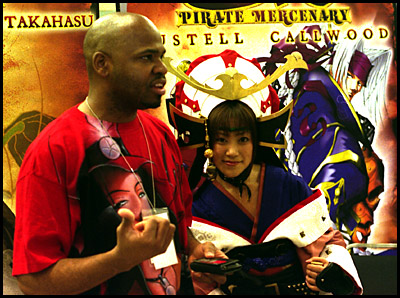
Austell Callwood, founder of Tenbu Productions, and cosplay model Yunmao Ayakawa talk with the crowd at the Mid-Atlantic Anime Convention in Richmond, Virginia. photo by Courtney Reid-Eaton
The Future of Japanese Cool
Okay, so now we leave Japan, and we're sliding back to the U.S., and back to the Mid-Atlantic Anime Convention in Richmond, Virginia.
"Right now we're noticing that a lot of people who love this stuff and create this stuff are turning into business people," says Austell Callwood, who formed his own international production company, Tenbu Productions. He was talking to fans and selling preview copies of his comic book.
"'Cove Pirate Mercenary' - it's based off of Japanese Buddhism plus a lot of Western pirate concepts," Callwood says. "So I kind of meshed both together and pushed them into the future that looks like a past."
Callwood is in his 30s. He lives in Springfield, Virginia. He's been a fan since before Japan got hot. He can still remember the first time he saw Japanese animation, in the early days of cable TV.
"I think I was 6 or 7 years old," he says. "I was over at a friend's house. I'm from the Virgin Islands but I lived in Florida. My friend had cable, and he said you've got to watch this show. And it was Battle of the Planets, known as Gotchaman in Japan."
He was captivated by Japanese storytelling, and still is.
"All my life, that has been my number one love."
Now, along with this new production company, Callwood owns and operates a DVD store in northern Virginia that specializes in Asian movies and TV shows.
It's a good business to be in right now.
"In the last two years," he says, "this industry blew up, I think one of the fastest industries in this nation that will not stop. I relate a lot of things to hip hop, because I personally grew up through hip hop from the 70s until now. It took 15 years for hip hop make it in the mainstream. It took two years for somebody to notice animation and take it to the level that it's at right now where it's on TV 24 hours a day here in America now."
I don't know if Austell Callwood will succeed as a manga artist, but what I was really struck by is his passion for the art, and his genuine respect for Japanese culture. He's even studied the language. And all around the world now, Japanese language courses are filling up like never before, thanks to the spread of Japanese cool stuff for young people.
You know, a lot of us used to assume that the West, and the U.S. in particular, had a lock on cool. Had a lock on pop culture. And Japan has proved that wrong. And Austell Callwood seems to think that's just fine.
"You know, with the Internet the world has become smaller," he says, "and so I think some of the glory, or the untouchableness of America - 'This is an American product: Oooh, wow!' I think that's kind of settled a bit because the world is smaller. Things are accessible now."
The output of Japan's pop culture industry is certainly very accessible to those thousands of young people who filled the Richmond Convention Center, and remember, more than 100 other anime conventions all across the country every year now.
I can't think of a time before this when so many people around the world could find so many ways to amuse themselves. And Japan, for a combination of reasons, cultural, economic, historical, seems just especially well positioned to create products for today's youth. They're open-minded, they're restless and they're very wired.
Asia in general is emerging as a center of cultural power to compete with North America and Europe. The competition's fierce. The only sure winner is the consumer.


